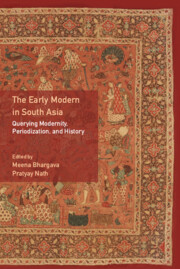2 - Locating the Early Modern in South Asian Sufism
Published online by Cambridge University Press: 06 September 2022
Summary
What constitutes the ‘early modern’ for South Asia is a question that has engaged a large number of scholars in recent times. The earliest traces of modernity for South Asia have been argued to have emerged around the sixteenth century as much from the impact of global processes as from developments within the region. The following discussion will explore the nature of this early modernity in the Indian subcontinent with regard to Sufi traditions.
The history of Sufism in this region has been rich and diverse, but most importantly continuous, alongside the rise and fall of political dynasties. This connection between institutionalized Sufi orders and Muslim political authority has deep roots that can be traced to Central Asia and Iran, where state ideology and Sufism have a long history of borrowing from each other. In this tradition, the rise and fall of rulers was intertwined with the idea of sainthood (wilayat) in the Persian tradition, where Sufi saints, believed to exercise spiritual sovereignty in God's earthly domain, leased out political authority to rulers over specific territories (sultanat). The worldly authority (walayat) of a Sufi was demarcated amongst masters of the same or different orders (tariqa), and after the death of the master it was conferred on his spiritual successor (khalifa). Following such a notion, it is not surprising therefore that the rise and decline of political orders came to be linked with the rise of Sufi orders under living saints or the passing away of influential Sufi masters.
Sufism in South Asia merits a historical analysis not as a monolithic, inward-looking spiritual tradition, but rather as a socio-religious practice deeply embedded in the doctrines of Islamic philosophy while at the same time having strong local connections with the state and society through intellectual and cultural production. While trying to understand what could have constituted early modernity for Sufism in this region within such a dynamic history, what can be treated as a point of departure is how Sufism participated in some of the broader trends identified with early modernity. In the period between the sixteenth and eighteenth centuries, early modernity in Sufi activities can be read in terms of three distinct but complementary tendencies.
- Type
- Chapter
- Information
- The Early Modern in South AsiaQuerying Modernity, Periodization, and History, pp. 43 - 63Publisher: Cambridge University PressPrint publication year: 2023



